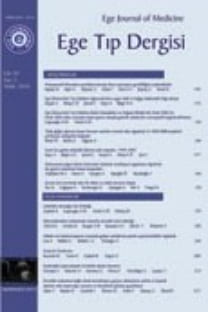Akciğer rezeksiyonu öncesi preoperatif değerlendirme
Preoperative evaluation of lung resection candidate
___
- 1) López-Encuentra A, Pozo-Rodríguez F, Martín-Escribano P, et al. Surgical lung cancer. Risk operative analysis. Lung Cancer 2004 ;44 :327-37.
- 2) İnci İ, Pabuşcu E. Preoperative evaluation in surgical treatment of lung cancer. Tuberk Toraks 2005;53 :210-20
- 3) Cicero LJ, Ponn RB, Daly BDT. Surgical treatment of non small cell lung cancer. In: Shields TW, Lo Cicero III J, Ponn RB; eds. General Thoracic Surgery. 5th ed. Philadelphia: Lippincott Williams &Wilkins; 2000:1311-41
- 4) Steinbaum SS, Uretzky ID, McAdams HP, et al. Exploratory thoracotomy for nonresectable lung cancer. Chest 1995 ;107 :1058-61.
- 5) Bolliger CT. Evaluation of operability before lung resection. Curr Opin Pulm Med 2003;9 :321-6
- 6) Akkoca Ö, Gülbay B, Altinkaya C, et al. The importance of exercise testing for the functional assessment of lung resectional candidates. Tuberk Toraks 2004;52 :307-14.
- 7) Brunelli A, Monteverde M, Borri A, et al. Predicted versus observed maximum oxygen consumption early after lung resection.. Ann Thorac Surg 2003 ;76 :376-80.
- 8) Cooke GA, Marshall P, Al-Timman JK, et al. Physiological cardiac reserve: development of a non-invasive method and first estimates in man. Heart. 1998;79 :289-94
- 9) Borg GA. Psychophysical bases of perceived exertion. Med Sci Sport Exerc 1982;14:377-81
- 10) Weisman IM, Zeballos RJ. Clinical exercise testing. Clin Chest Med 2001;22:679-701.
- 11) Ware JE, Sherbourne CD. The MOS 36-item short-form health survey (SF-36). I. Conceptual framework and item selection. Med Care 1992 ;30 :473-83
- 12) Koçyiğit H, Aydemir Ö, Ölmez N, ve ark. SF 36'nın Türkçe geçerliliği ve güvenirliği. Ege Fizik Tedavi ve Rehabilitasyon Dergisi 1999
- 13) Pierce RJ, Copland JM, Sharpe K, et al. Preoperative risk evaluation for lung cancer resection: predicted postoperative product as a predictor of surgical mortality. Am J Respir Crit Care Med 1994 ;150 :947-55.
- 14) Wyser C, Stulz P, Solèr M, et al. Prospective evaluation of an algorithm for the functional assessment of lung resection candidates. Am J Respir Crit Care Med 1999 ;159:1450-6.
- 15) Bolliger CT, Jordan P, Solèr M, et al. Exercise capacity as a predictor of postoperative complications in lung resection candidates. Am J Respir Crit Care Med 1995 ;151:1472-80.
- 16) Melendez JA, Carlon VA. Cardiopulmonary risk index does not predict complications after thoracic surgery. Chest 1998 ;114 :69-75.
- 17) Bolliger CT, Perruchoud AP. Functional evaluation of the lung resection candidate. Eur Respir J 1998 ;11 :198-212.
- 18) Olsen G.N. Pulmonary physiologic assessment of operative risk. Eds.: Shields. T. W., Lo icero, J., Pon, R. B.: General Thoracic Surgery. 4 th edition, Philadelphia, PA: lippincot Williams and Wilkins, 2000, p297-304
- 19) Akkoca Ö. Göğüs Cerrahisinde Preoperatif Değerlendirme, Eds.: Ökten İ, Güngör A. Göğüs Cerrahisi 1. baskı, Ankara, Sim Matbaacılık, 2003, s95-200
- 20) Smetana GW. Preoperative pulmonary evaluation. N Engl J Med 1999;340 :937-44.
- 21) Ferguson MK. Preoperative assessment of pulmonary risk. Chest. 1999 ;115 :58S-63S.
- 22) BTS-guidelines: guidelines on the selection of patients with lung cancer surgery. Thorax 2001; 56: 89-108
- 23) Bolliger CT, Wyser C, Roser H, et al. Lung scanning and exercise testing for the prediction of postoperative performance in lung resection candidates at increased risk for complications. Chest. 1995 ;108 :341-8.
- 24) Brunelli A, Al Refai M, Monteverde M, et al. Stair climbing test predicts cardiopulmonary complications after lung resection. Chest. 2002 ;121 :1106-10.
- 25) Wang JS, Abboud RT, Evans KG, et al. Role of CO diffusing capacity during exercise in the preoperative evaluation for lung resection. Am J Respir Crit Care Med 2000 ;162 :1435-44.
- 26) Morice RC, Peters EJ, Ryan MB, et al. Exercise testing in the evaluation of patients at high risk for complications from lung resection. Chest 1992 ;101 :356-61.
- 27) Smith TP, Kinasewitz GT, Tucker WY, et al. Exercise capacity as a predictor of post-thoracotomy morbidity. Am Rev Respir Dis 1984 ;129 :730-4
- 28) Wang J, Olak J, Ultmann RE, et al. Assessment of pulmonary complications after lung resection. Ann Thorac Surg. 1999 ;67 :1444-7.
- 29) Starobin D, Kramer MR, Yarmolovsky A, et al. Assessment of functional capacity in patients with chronic obstructive pulmonary disease: correlation between cardiopulmonary exercise, 6 minute walk and 15 step exercise oximetry test. Isr Med Assoc J 2006 ;8 :460-3.
- 30) Leyenson V, Furukawa S, Kuzma AM, et al. Correlation of changes in quality of life after lung volume reduction surgery with changes in lung function, exercise, and gas exchange. Chest 2000 ;118 :728-35
- 31) Sørensen JB, Kragstrup J, Kjaer K, et al. Exercise on prescription: trial protocol and evaluation of outcomes. BMC Health Serv Res. 2007 ;7:36.
- ISSN: 1016-9113
- Yayın Aralığı: 4
- Başlangıç: 1962
- Yayıncı: Ersin HACIOĞLU
Diferansiye tiroit kanserlerinin takibinde tiroglobulin otoantikorunun önemi
A. AKGÜN, B. YAZICI, Ö. ERDİM, Ü. YARARBAŞ, H. ÖZKILIÇ
Hiperimmünglobulin E sendromlu bir olguda molluskum kontagiosum ve cidofovir tedavisi
N. Edeer KARACA, G. AKSU, N. KÜTÜKÇÜLER
Akciğer rezeksiyonu öncesi preoperatif değerlendirme
K. TURHAN, H. KARAPOLAT, S. EYİGÖR, A. ÖZDİL, A. ÇAKAN, U. ÇAĞRICI
Invasive pulmonary aspergillosis in an immunocompetent infant associated with short term steroid
A. ERDEMİR, A. BABAYİĞİT, D. ÖLMEZ, N. UZUNER, Ö. KARAMAN, B. MAKAY, Ö. ANAL
Herediter hemorajik telenjiektazili bir hastada portosistemik şant ve renkli Doppler görünümü
Kene ısırığı nedeniyle başvuran olguların değerlendirilmesi
İ. ARIKAN, Ü. TIRAŞ, D. SARAÇOĞLU, M.A. TAŞAR, Y. DALLAR
Clinical dilemma on retropharyngeal cellulitis and croup
E. U. SAZ, G. ERDEMİR, S. ÖZEN, S. AYDOĞDU
Zemin aktivitesi değerlendirilmesinde kantitatif elektroensefalografi analiz yöntemi
Diyabetik ayak gelişen ve üriner sistem kandidozu olan bir olgu sunumu
